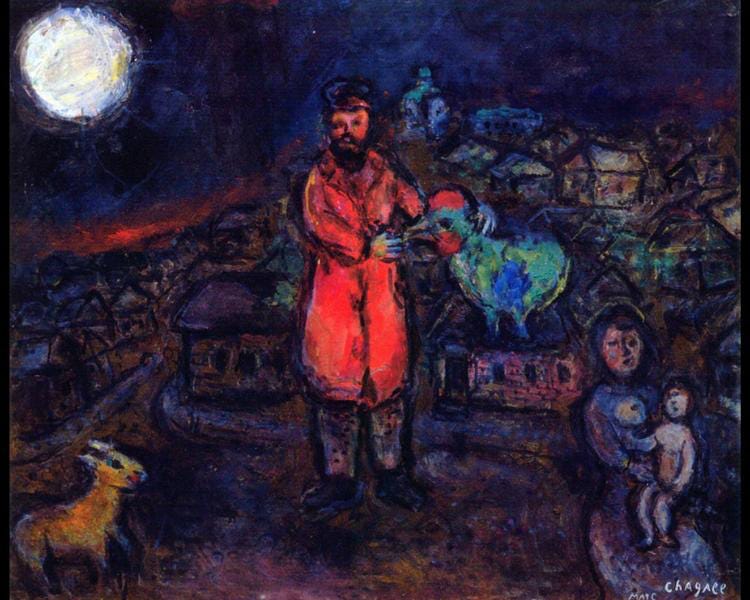Morning and Evening, Pt. XV
The fifteenth installment in an ongoing narrative, told week by week
Previously: Morning and Evening, Parts I, II, III, IV, V, VI, VII, VIII, IX, X, XI, XII, XIII and XIV
Chapter 7
The days grew steadily darker and damper and when Yossel went to heder now he scattered a carpet of mist with his feet, kicking at the heavy air, which settled back against the ground unperturbed. The cold drops clung to his shins in their threadbare fabric. At the very least the damp chill suppressed the stench of waste—from cows and sheep, chicken and ducks, horses and men alike—that made the village paths suffocating in the hot summer; though Yossel did not like to think very hard about the composition of the mud under his shoes, the clean smell of the pale cold air was cause for gratitude.
The nights were crowned with a thin silver scythe of a moon, which, as it fattened, only grew harder and colder. It scattered its harsh light over the balding crowns of the poplars. The paths were dotted with blue mirrored pools, fruit of the hard rains that came pelting over the northern hill.
Hanachiv readied itself for the long winter. Men and women both hauled barrels of root vegetables down into cool cellars, sweet, fat, wrinkled turnips and carrots, pried from the earth before the frost. Jews and Gentiles alike celebrated a good harvest: the Gentiles for the food they had wrung from their fields, the Jews for their share of it and its profits. In thin years, when the fields were flinty and unkind, the Jews, who had no land of their own, went hungriest of all; they slaughtered what animals they had, they wrote to the greater towns for bread money and the greater towns wrote to the cities, Lemberg and Vilnius and Moscow. The headlines were grim in the Yiddish newspapers Nathan-Neta and Ettinger and the other merchants read, in those years of famine; hunger was slower than a pogrom, but it killed just as well or better. Sometimes envoys appeared with purses from the communal funds, and sometimes did not. Hunger had left its bloody mark on all of Hanachiv’s wood lintels. But this was a good harvest, and in its honor cups and plates were raised and filled in the houses of Poles, Jews, and Ukrainians.
Autumn was also the time for the salting and laying-away of meat. The last old rams and fatted calves were butchered side by side, sighing blood from their white necks. They were chopped, by Herschl the butcher’s boy and an array of Gentile farmers, into red haunches and shreds of discarded pelt, and their bones cast over the fields to rot and make the soil rich for the coming spring. The working day grew shorter and shorter, and the sky donned its heavy down mantle of cloud. This it would wear throughout the winter, except on those few days, coldest of all, where the sun shone icily over the snowbound fields. The sky itself would turn blue as frosted glass, and the air would burn to breathe.
Keep reading with a 7-day free trial
Subscribe to The Sword and the Sandwich to keep reading this post and get 7 days of free access to the full post archives.




